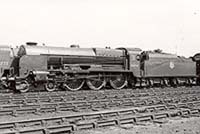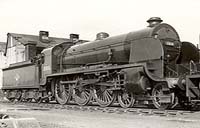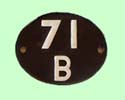|
In
an earlier edition of "Locomotive Performance", which covered
my journeys on the Bournemouth line in 1956, I was critical of the
standard of running on the route, particularly the Bulleid pacifics, and
of the over generous timings then in operation.
My
next visits to the line were in 1959 and 1960, by which time there had
been several interesting developments. Many of the Bulleid 4-6-2 had
been rebuilt, with several of the revolutionary features disbanded. The
result was a conventional and more reliable design, easier and less
costly to maintain, and certainly more economical with coal. Whether their performance, in terms of pulling
power, was enhanced is another matter.
Meanwhile,
2 hour timings to Bournemouth were back, though there was little
improvement to schedules of the semi fast services. And the developments
on the South Eastern lines, with diesel multiple units on The Hastings
line, and gradual electrification on the Kentish lines, had meant a
re-allocation of Bulleids, King Arthurs and Schools on to the Western
section Waterloo lines. The Schools 4-4-0's carried out secondary duties
during the week, ie Waterloo to Basingstoke semi fasts, but on summer
Saturdays worked the Waterloo to Lymington Pier services, the Wimbledon
to Weymouth service, together with at least one Bournemouth service,
which allowed
them, with a clear road, to stretch their legs.
|
|


